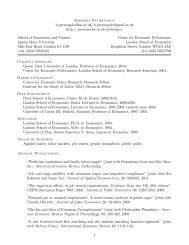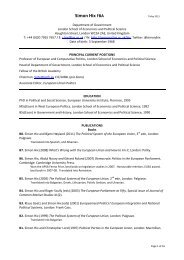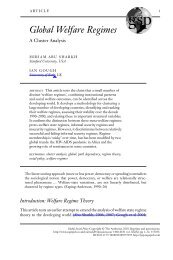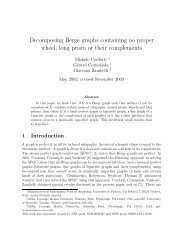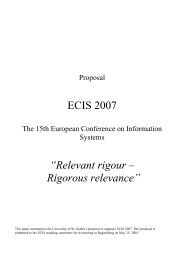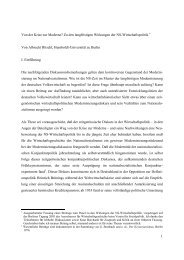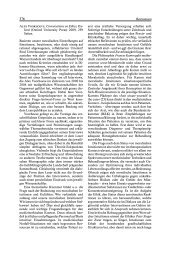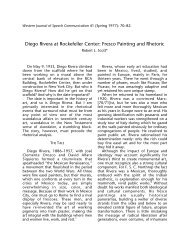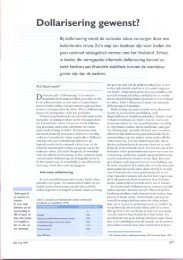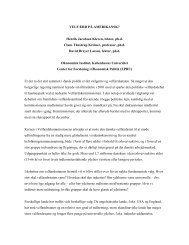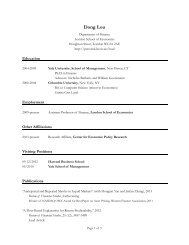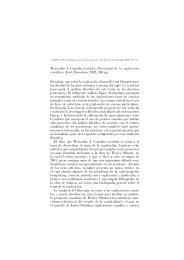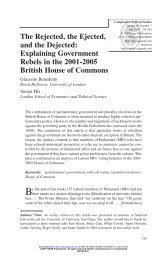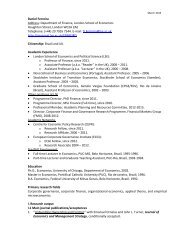View PDF - LSE - London School of Economics and Political Science
View PDF - LSE - London School of Economics and Political Science
View PDF - LSE - London School of Economics and Political Science
Create successful ePaper yourself
Turn your PDF publications into a flip-book with our unique Google optimized e-Paper software.
earned” (Merrifield 2006:140). The key is to “bring people together to oppose the<br />
‘omnipotence’ <strong>of</strong> the state <strong>and</strong> multinational capital” (ibid.).<br />
One <strong>of</strong> the challenging questions is whose rights count, which is at the core <strong>of</strong> Peter<br />
Marcuse’s enquiry (Marcuse 2009). Marcuse’s reinterpretation <strong>of</strong> Lefebvre underst<strong>and</strong>s<br />
the right to the city as involving “an exigent dem<strong>and</strong> by those deprived <strong>of</strong> basic material<br />
<strong>and</strong> existing legal rights, <strong>and</strong> an aspiration for the future by those discontented with life<br />
as they see it around them, perceived as limiting their own potentials for growth <strong>and</strong><br />
creativity” (2009:190). Here, Marcuse makes a distinction using economic <strong>and</strong> cultural<br />
terms to define whose right we need to protect <strong>and</strong> exp<strong>and</strong>. Economically, the deprived<br />
are classified to include the excluded (who are part <strong>of</strong> the capitalist system but without<br />
the same level <strong>of</strong> social protections gained by the working class) <strong>and</strong> the working class<br />
itself. In cultural terms, Marcuse puts emphasis on exp<strong>and</strong>ing the right <strong>of</strong> the directly<br />
oppressed (in race, ethnicity <strong>and</strong> so on) <strong>and</strong> the alienated (<strong>of</strong> any factions <strong>of</strong> economic<br />
class <strong>and</strong> social groups that resist the ruling system) (Marcuse 2009). Other than these,<br />
those ruling groups who hold material interests (eg business people, gentry, capitalists,<br />
establishment intelligentsia <strong>and</strong> political elites) are thought to have already acquired the<br />
right to the city in their own terms. This point has also been echoed by David Harvey<br />
who also laments that “Increasingly, we see the right to the city falling into the h<strong>and</strong>s <strong>of</strong><br />
private or quasi-private interests” (Harvey 2008:38).<br />
The perspective <strong>of</strong> the right to the city has been around for some time, but it is yet to be<br />
translated into fully established urban practices. It is imperative to seek strategies<br />
attuned to various urban contexts, as the forms <strong>and</strong> shapes <strong>of</strong> the struggle for the right to<br />
the city should be imagined by taking into account the local configuration <strong>of</strong><br />
institutional regulatory structure as well as the contradictions within specific political<br />
economic systems. As Dikeç states, “approaches to, <strong>and</strong> principles <strong>of</strong>, justice are time<br />
<strong>and</strong> space specific” (2001: 1788). Therefore, any discussions about identifying the<br />
emancipatory right to the city <strong>and</strong> organising its corresponding movement should<br />
address this spatio-temporal specificity. With the need to involve marginalised urban<br />
populations <strong>and</strong> form a solidarity that encompasses conventional class-based labour<br />
movements, the right to the city movement becomes a struggle that strives to secure<br />
access not only to urban space but also to “political space” (Dikeç 2001:1790), while<br />
being sensitive to specific urban socio-political, economic <strong>and</strong> institutional contexts.<br />
Shin, H.B. (2013) Antipode DOI: 10.1111/anti.12010 | Page 5 <strong>of</strong> 29



